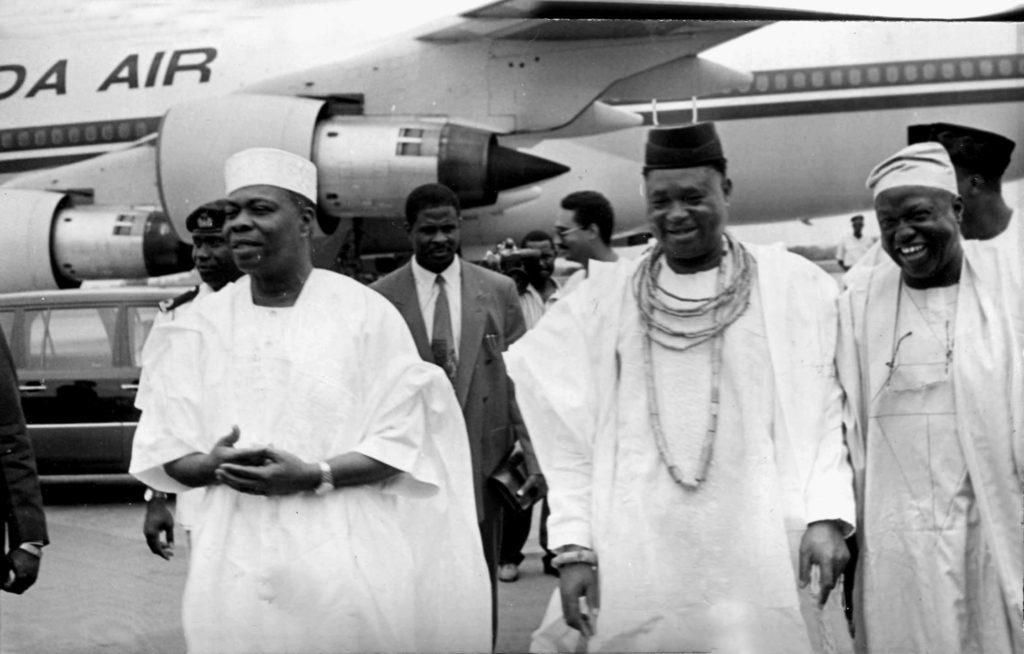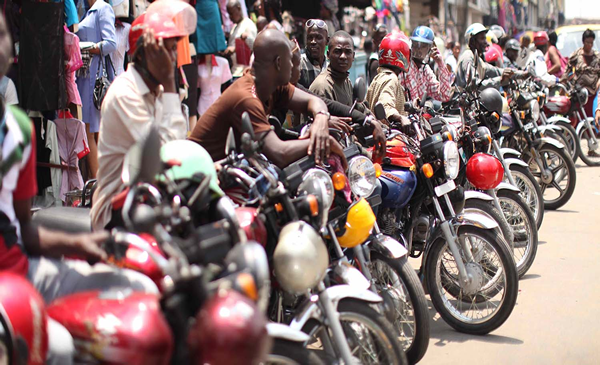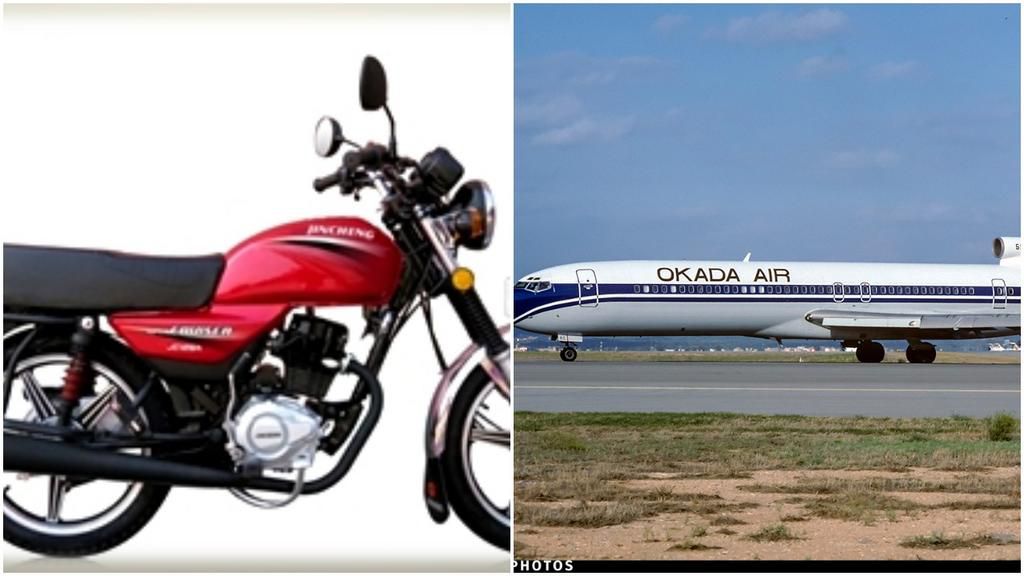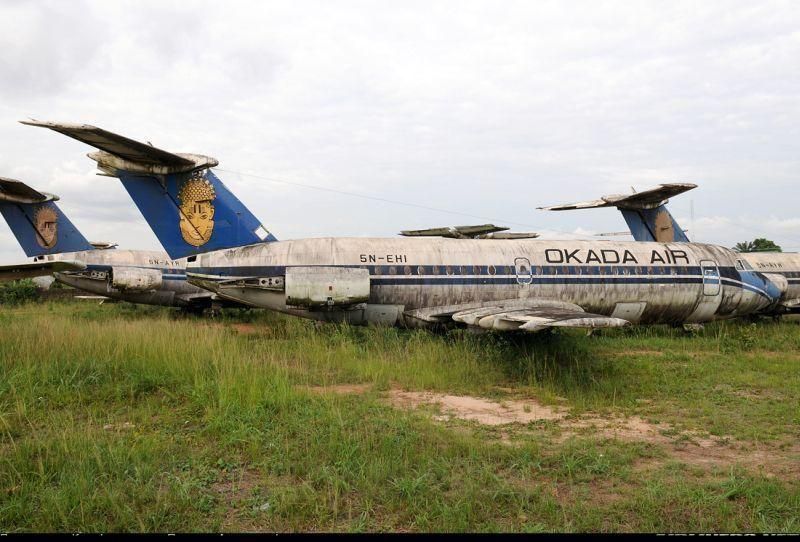This is how the ‘Okada’ got its name [Pulse Explainer]
)
Okada recently became a globally recognised word in the dictionary and it would be interesting to know where it originated from.
The generally acceptable word to describe a motorcycle used mainly for transportation of humans and goods in Nigeria is Okada.
Now for a lot of people, the word Okada simply means a motorcycle; but the truth behind it is that there is more to the name and its origin. Only recently, the popularity of Okada received some global recognition as ‘Okada’ was officially added to the English lexicon.
Several words, mainly of West Africa origin, made it to the dictionary in 2020. However, the one that got my attention was that of Okada. A lot of people who grew up in Benin City or any other part of Edo state like me would know that Okada is more than just a motorcycle.
![The popular ring road in the ancient capital city of Benin-city, captial of Edo State. [TheGuardian]](https://image.api.sportal365.com/process/smp-images-production/pulse.ng/16082024/68835103-473d-43d9-b797-7f8cf7030849)
The word Okada is actually the name of a town and the headquarters of Ovia North-East Local Government Area in Edo State. Yes, I know a lot of people probably had no prior knowledge of this major information before reading that last sentence.
![The generally acceptable word to describe a motorcycle used mainly for transportation of humans and goods in Nigeria is Okada. [Medium]](https://image.api.sportal365.com/process/smp-images-production/pulse.ng/16082024/d419b9dd-1f7d-4a71-8647-7a33338b4d57)
Okada meaning: A motorcycle that is used as a taxi.
Chief Gabriel Osawaru Igbinedion
![In the 1960s, a certain businessman named Chief Gabriel Osawuru Igbinedion, the Esama of the Benin Kingdom who hailed from the town Okada, began expanding his various businesses across the country. [GabrielIgbinedion]](https://image.api.sportal365.com/process/smp-images-production/pulse.ng/16082024/eb18284d-596f-4d0f-b99d-90b88f18c7a6)
In the 1960s, a certain businessman named Chief Gabriel Osawaru Igbinedion, the Esama of the Benin Kingdom who hails from the town Okada, began expanding his various businesses across the country.
![The police officer turned businessman became a force to reckon with in the country after the establishment of Midway Motors in 1968 which was specialised in assembling cars in the country. [GabrielIgbinedion]](https://image.api.sportal365.com/process/smp-images-production/pulse.ng/16082024/a8742c7a-0d43-4b1f-94fa-3a8500fe449c)
The police officer turned businessman became a force to reckon with in the country after the establishment of Midway Motors in 1968 which was specialised in assembling cars in the country.

The establishment of that company saw the wealth of the Esama grow tremendously. Even though the Esama of Benin bought his first private jet in 1981, the billionaire businessman established the very first private airline in Nigeria in 1983 and named it ‘Okada Airlines.’
![One of the planes (Boeing 727-230) belonging to Okada Airlines [JetPhotos]](https://image.api.sportal365.com/process/smp-images-production/pulse.ng/16082024/65b1aea5-5d75-49a5-9ef6-0658cdaecb3b)
The establishment of that airline was such a huge deal that the military head of state at that time, General Ibrahim Badamosi Babangida, sent his vice president, Admiral Augustus Aikhomo to commission the purchase of one of its biggest planes, Boeing 747 Jumbo Jet in 1992.
![A photo of some of the air hostesses working with the first indigenous airline, Okada Airlines [GabrielIgbinedion]](https://image.api.sportal365.com/process/smp-images-production/pulse.ng/16082024/5f2b4c8b-5a8b-44f7-8e90-69ba36cae1cf)
Okada Airlines began to grow in leaps and bounds as the company had over ten planes in its fleet. Owning the first private airline in Nigeria not only made Chief Gabriel Igbinedion one of the richest men in Africa but a very powerful and influential political figure in the country.
The rise of Okada motorcycles in Nigeria

In the 1980s, during the military era, while a few were getting richer due to corruption and failed government policies, Nigeria’s infrastructure began suffering monumental collapse across the country.
One major sector in the economy that was hugely affected was intracity transportation. As Nigerians strove to survive in tough terrains, the use of motorcycles as an alternative means of transportation in major cities in the country like Lagos, Ibadan, Kano, Benin-City, Warri, Kaduna, Enugu, Port Harcourt, and Calabar, became an imperative.
![Recall that it was around this same period that the popular Okada Airlines was flying the Nigerian flag across Africa. Its popularity was even felt amongst the poor who couldn't afford or even dream of flying a plane. [AlJazeera]](https://image.api.sportal365.com/process/smp-images-production/pulse.ng/16082024/e149bafe-31c7-4530-b6b9-af944ed1574b)
Recall that it was around this same period that the popular Okada Airlines was flying the Nigerian flag across Africa. Its popularity was even felt amongst the poor who couldn't afford or even dream of flying a plane. So, to sell the idea of cheap means of transportation around the cities across the country, motorcycles were named after Okada Airlines.

The name Okada Airlines was too long or complicated to call a motorcycle as the rider might not even know how to pronounce 'Airlines,' hence it was cut short to Okada. It was easy to tell a young, struggling farmer or teacher that riding on an Okada motorcycle will give you the same fast speed he/she would have experienced on an Okada Airline Boeing 747 Jet.
![Fast forward to a few years later. Nigeria moved from importers of motorcycles to establishing and assembling plants in several cities especially across the Eastern part of the country. [PremiumTimes]](https://image.api.sportal365.com/process/smp-images-production/pulse.ng/16082024/973879de-a9fb-415e-96b6-54945792907d)
In no distant time, the name Okada became the name for all motorcycles used for public transportation across the country. It was fast, cheap, and readily available for even individuals living below the poverty line.
Fast forward to a few years later. Nigeria moved from importers of motorcycles to establishing and assembling plants in several cities especially across the Eastern part of the country.
The flip side of the Okada motorcycle
![It won't be wrong if you include riding on an Okada in the '1000 ways to die' show. Since its introduction and popularity, it has become one of the easiest routes to road accidents in the country. [Medium]](https://image.api.sportal365.com/process/smp-images-production/pulse.ng/16082024/b40e3814-3dce-4982-a4ce-666643e12572)
It won't be wrong if you include riding on an Okada in the '1000 Ways To Die' show. Since its introduction and popularity, it has become one of the easiest routes to road accidents in the country. This is due to the manner these riders conduct themselves on the roads.
The truth is that with N300,000 and N400,000, anyone can walk into a shop and get an Okada. A lot of times, Okada riders do not go through any training before becoming ‘professionals’. Once you can afford one, practice behind your compound for a few days, you can hit the road and become an Okada rider.
![The truth is that with N300,000 and N400,000, anyone can walk into a shop and get an Okada [Nairaland]](https://image.api.sportal365.com/process/smp-images-production/pulse.ng/16082024/02136ede-a03b-40d9-bd89-651a37c7e61b)
This is coupled with the fact that laws to control the use of motorcycles for commercial use are lax or non-existent. So I won't bore you with too many stats on Okada accidents. Let’s just share with you what the casualty figures of Okada accidents have been between 2010 to 2014.
![According to the African Journal for Trauma, during the 4 years between August 2010 and July 2014, there were 128 motorcycle death autopsies recorded. Of this number, 96 cases (75%) were recorded in Lagos state alone. [TopNews]](https://image.api.sportal365.com/process/smp-images-production/pulse.ng/16082024/e1a72fa3-8e02-43de-b1c8-9cb4e2ab4c98)
According to the African Journal for Trauma, during the 4 years between August 2010 and July 2014, there were 128 motorcycle death autopsies recorded. Of this number, 96 cases (75%) were recorded in Lagos state alone.
The report also states that within a period of 2 years before the traffic law, a total of 411 Road Traffic Accident autopsies were recorded, out of which 96 cases (23.4%) were from motorcycle accidents. Similarly, out of the 286 RTA death autopsies done during 2 years after the law, 32 cases were due to motorcycle accidents which represent 11.2%.
![The report also states that within a period of 2 years before the traffic law, a total of 411 Road Traffic Accident autopsies were recorded, out of which 96 cases (23.4%) were from motorcycle accidents. [OkayFM]](https://image.api.sportal365.com/process/smp-images-production/pulse.ng/16082024/236838ff-3e83-4665-ba1d-8238cea0ba11)
In 2020, the Lagos state government banned the use of Okadas and tricycles popularly known as Keke Napep, in six major local governments. According to the government, this means of transportation has become responsible for not just accidents but for the increase in crime rates in the state.
![In 2020, the Lagos state government banned the use of Okadas and tricycles popularly known as Keke Napep, in six major local governments. [KanyiDaily]](https://image.api.sportal365.com/process/smp-images-production/pulse.ng/16082024/1a79c6c4-039c-4c3c-8e09-b5b3a5cf7950)
Edo state, from where the name Okada originated, banned motorcycles as a means of transportation in 2013 for similar reasons. However, the motorcycle is still used as a means of transportation in other towns in the state, including in Okada town.
Okada Airlines today

By the mid-1990s, Okada Airlines began to witness a decline in its popularity and standard. The airline recorded three major crashes between 1988, 1991 and 1992. The airline finally wound down operations in 1997. It however tried to bounce back in the early 2000s to no avail.
According to its Chairman, Igbinedion, the whole process was ethnicised and politicised by government officials. The Chief wondered how five airlines whose operational facilities could not be compared in standard to those of Okada Airlines, were granted licenses and his airline denied one.
![However, Chief Igbinedion remains one of the wealthiest men in the country with various businesses spanning the education, broadcasting, banking, farming and media sectors in the country. [Herald]](https://image.api.sportal365.com/process/smp-images-production/pulse.ng/16082024/e6c012dc-125a-4ba2-a0d0-9b07f07b40f3)
However, Chief Igbinedion remains one of the wealthiest men in the country with various businesses spanning the education, real estate, broadcasting, banking, farming, entertainment and media sectors in the country bearing his name.
Okada town
![Okada town, from where the commercial motorcycle got its name, is home to the first private university in the country--Igbinedion University owned by Chief Igbinedion. [InfoGuideNigeria]](https://image.api.sportal365.com/process/smp-images-production/pulse.ng/26072024/0b297b50-f9f4-41aa-b7ae-afe4365b8b18)
Okada town, from where the commercial motorcycle got its name, is home to the first private university in the country--Igbinedion University owned by Chief Igbinedion. It also houses a huge cattle ranch where Esama's huge farming business is located.
Another interesting thing about the Okada town is that it has a teaching hospital, established by Chief Igbinedion, and the famous 'Okada Wonderland,' an amusement park built by the Esama in the 1980s.
![Chief Gabriel Igbinedion and his large family during one of his flamboyant birthday parties. [ITVBenin]](https://image.api.sportal365.com/process/smp-images-production/pulse.ng/16082024/ebabc4f3-012b-4c14-b0c4-8be01ae76f3b)
The Igbinedions have been so influential in that town that the family has produced the first governor from that town in Chief Lucky Igbinedion, a local government chairman (Mr Charles Igbinedion) and a former House of Representatives member (Barr Omosede Igbinedion).
At some point, one of Chief Igbinedion’s sons, Peter, was the Managing Director of the Federal Airports Authority of Nigeria (FAAN).
![Aisha blows hot on Security forces; Y7ou won't believe what she said [VIDEO]](https://image.api.sportal365.com/process/smp-images-production/pulse.ng/17082024/1f976edf-1ee2-4644-8ba1-7b52359e1a8f?operations=autocrop(640:427))
)
)
)
![Lagos state Governor, Babajide Sanwo-Olu visited the Infectious Disease Hospital in Yaba where the Coronavirus index patient is being managed. [Twitter/@jidesanwoolu]](https://image.api.sportal365.com/process/smp-images-production/pulse.ng/16082024/377b73a6-190e-4c77-b687-ca4cb1ee7489?operations=autocrop(236:157))
)
)
)
)
)
)
)
)
)
)
)